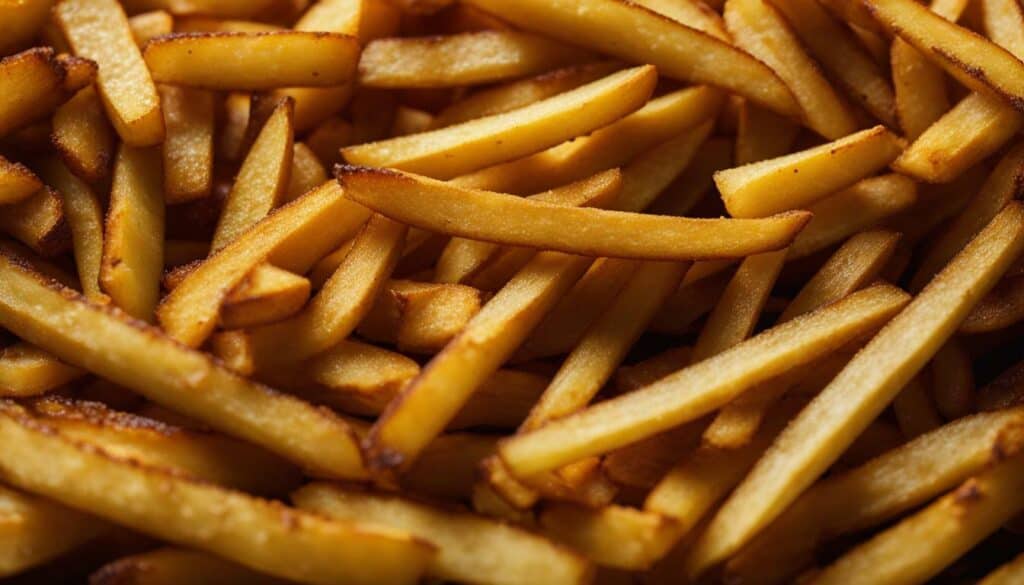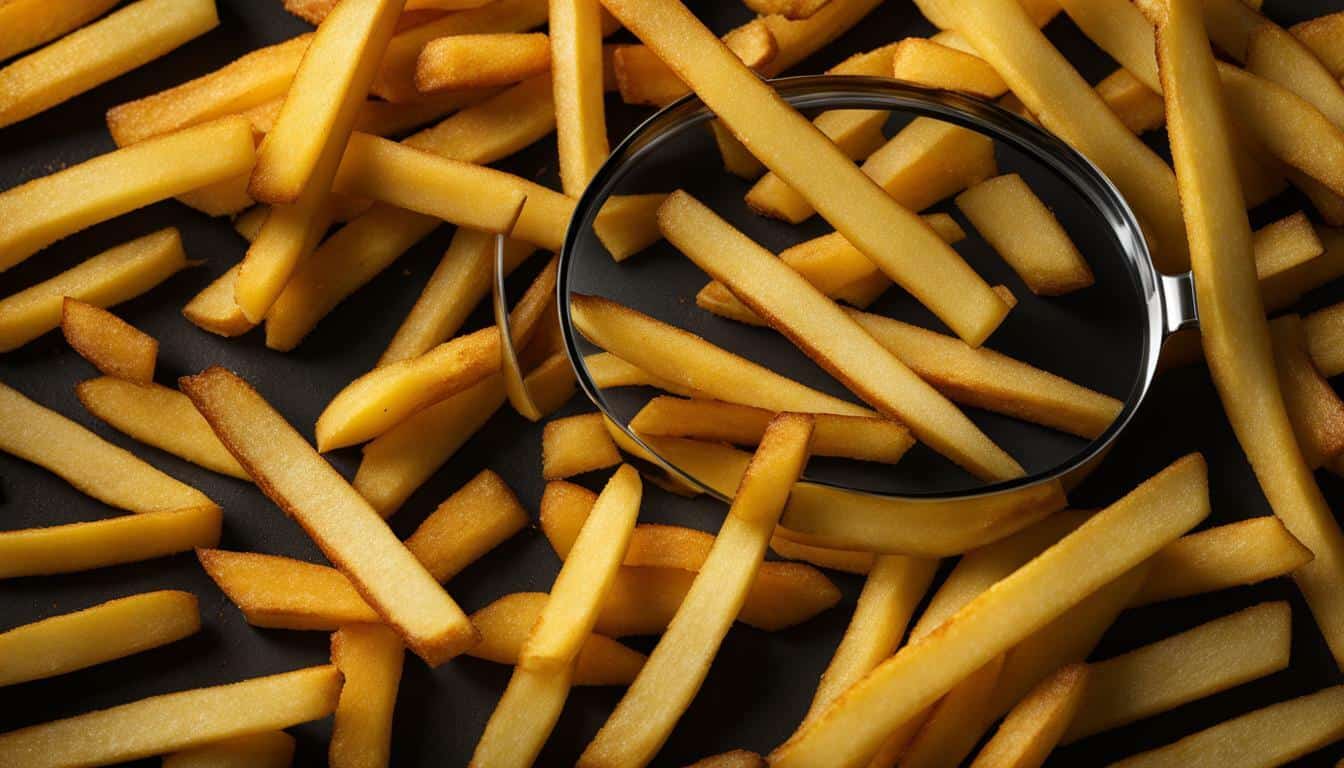French fries are a beloved indulgence, but have you ever wondered how many carbs are hiding in those crispy potato sticks? In this article, I will take you on a journey into the world of french fries and uncover the truth about their carbohydrate content. We will explore the nutritional value of this popular side dish and provide insights on how to make healthier choices when consuming french fries.
- French fries are high in fat, calories, and sodium.
- One serving of french fries contains 196 calories and 18.5 grams of carbohydrates.
- Calorie counts can vary depending on how the fries are prepared.
- French fries are a moderate to high glycemic food and can cause spikes in blood sugar levels.
- Fast food options generally have higher fat content.
The Carb Count in French Fries
French fries may be tasty, but they also pack a punch when it comes to carbohydrates. Many people enjoy this popular side dish without realizing just how many carbs are in a serving. So, let’s dive into the carb content of french fries and discover the truth behind this starchy indulgence.
On average, one serving of french fries contains around 18.5 grams of carbohydrates. However, it’s important to note that the exact carb count can vary depending on factors such as the type of potatoes used, the thickness of the fries, and the cooking method employed. French fries that are deep-fried tend to have a higher carb content compared to those that are oven-baked or air-fried.
It’s also worth mentioning that the carb count mentioned above is for a standard serving size, which is typically around 117 grams or 4 ounces. If you consume larger portions, the carb content will naturally increase. So, it’s crucial to be mindful of portion sizes when enjoying french fries.

| French Fries Type | Carbohydrate Content (per serving) |
|---|---|
| Fast Food Fries | Average of 18.5 grams |
| Oven-Baked Fries | Average of 15 grams |
| Air-Fried Fries | Average of 14 grams |
To put the carb count into perspective, one serving of french fries contains roughly the same amount of carbs as a slice of bread. So, if you’re watching your carb intake, it’s essential to consider the carb content of french fries and make informed choices when including them in your meals.
Calorie Counts and Macronutrients
To fully understand the nutritional value of french fries, it’s important to consider their calorie content and macronutrient composition. One serving of french fries, typically weighing around 117 grams, contains approximately 196 calories. This calorie count can vary depending on factors such as portion size and the specific preparation method.
French fries are primarily made up of carbohydrates, with each serving containing about 18.5 grams. This carbohydrate content provides the body with energy, but it’s important to consume them in moderation to maintain a balanced diet. Additionally, french fries contain about 13 grams of fat per serving. Fast food options often have higher fat content, so it’s essential to be mindful of your choices.
While french fries are not a significant source of protein, they do offer some essential vitamins and minerals. A serving of french fries can provide approximately 6 milligrams of vitamin C, which is about 7% of the recommended daily intake. They also contain about 0.3 milligrams of vitamin B6, contributing to overall health and well-being. Potassium, an important electrolyte for muscle function, is also present in french fries, with a serving containing around 281 milligrams.
It’s important to note that the nutritional value of french fries can vary based on the preparation method. Homemade fries made in the oven or air fryer using fresh potatoes can be a healthier option as they generally contain less fat and sodium. It’s also worth mentioning that french fries are best enjoyed immediately after cooking, as they tend to lose their texture when they cool down.
| Nutrient | Amount per Serving (117g) |
|---|---|
| Calories | 196 |
| Carbohydrates | 18.5g |
| Fat | 13g |
| Vitamin C | 6mg |
| Vitamin B6 | 0.3mg |
| Potassium | 281mg |
The impact of french fries on blood sugar levels is a crucial aspect to consider, especially for individuals with diabetes or those following a low glycemic diet. French fries fall into the category of moderate to high glycemic foods, which means they can cause spikes in blood sugar levels. This is primarily due to the high carbohydrate content of french fries.
One serving of french fries contains approximately 18.5 grams of carbohydrates. However, it’s important to note that the glycemic impact can vary depending on the preparation method. For example, deep-frying fries at high temperatures can increase the glycemic index, while baking or air frying may have a lower impact on blood sugar levels.
To mitigate the glycemic impact of french fries, it’s recommended to opt for healthier alternatives or consume them in moderation. Pairing french fries with a balanced meal that includes protein, fiber, and healthy fats can help stabilize blood sugar levels. It’s also advisable to monitor portion sizes and avoid excessive consumption of high glycemic foods.

As with any food, it’s important to consult with a healthcare professional or registered dietitian for personalized advice, especially if you have specific dietary concerns or medical conditions. They can provide guidance on managing blood sugar levels and incorporating french fries or other high glycemic foods into a balanced diet.
Fat Content in French Fries
It’s no secret that french fries are not the healthiest choice due to their significant fat content. One serving of french fries contains about 13 grams of fat, with fast food options typically having even higher fat content. This is because french fries are typically deep-fried in oil, which adds to their calorie and fat content.
When it comes to fat, not all french fries are created equal. The fat content can vary depending on the type of fries and the preparation method. For example, thin-cut fries or shoestring fries tend to absorb more oil during frying, resulting in a higher fat content. On the other hand, thicker-cut fries or oven-baked fries may have a lower fat content because they require less oil.

It’s important to note that while fat is an essential macronutrient that our bodies need, consuming too much saturated and trans fats can increase the risk of heart disease and other health issues. Therefore, it’s recommended to enjoy french fries in moderation and opt for healthier alternatives when possible.
Vitamins and Minerals in French Fries
Surprisingly, french fries contain certain vitamins and minerals that can contribute to your overall nutrient intake. Despite being known for their high fat and sodium content, they do offer some nutritional value.
One of the key vitamins found in french fries is vitamin C. A serving of french fries can provide about 32 milligrams of vitamin C, which is about 36% of the recommended daily intake for adults. Vitamin C is an important antioxidant that helps protect your body against free radicals and supports a healthy immune system.
In addition to vitamin C, french fries also contain vitamin B6. This vitamin plays a crucial role in brain development and function, as well as in the production of red blood cells. A serving of french fries can provide about 0.3 milligrams, which is approximately 20% of the recommended daily intake for adults.
When it comes to minerals, potassium is the standout in french fries. Potassium is an essential mineral that helps regulate blood pressure, balance fluids in the body, and support proper muscle and nerve function. A serving of french fries can provide about 406 milligrams of potassium, which is approximately 12% of the recommended daily intake for adults.

| Nutrient | Amount per Serving | % Daily Value |
|---|---|---|
| Vitamin C | 32 mg | 36% |
| Vitamin B6 | 0.3 mg | 20% |
| Potassium | 406 mg | 12% |
While it’s important to note that the nutritional value of french fries can vary depending on the preparation method and additional ingredients, these vitamins and minerals can still be beneficial to your overall health. Just remember to enjoy french fries in moderation and consider healthier alternatives, such as homemade oven-baked or air-fried fries, to reduce the fat and sodium content.
The Importance of Preparation Method
The method of preparing french fries plays a crucial role in determining their overall nutritional value. While these crispy treats are undeniably delicious, their high fat and sodium content can pose health risks. However, by making a few simple changes to the way french fries are prepared, you can enjoy a healthier version without compromising on taste.
One popular alternative to traditional deep-frying is oven-baked french fries. By tossing fresh potato slices with a small amount of olive oil and baking them in the oven, you can achieve a crispy texture with less fat. This method cuts down on the oil needed for frying and reduces the overall calorie count.
“Oven-baked french fries are a great option for those looking to lower their fat intake while still satisfying their crispy cravings.” – Registered Dietitian
Another option gaining popularity is air-frying. This technique involves using hot air to cook the potatoes, which eliminates the need for excessive oil. Air-fried french fries can have a similar texture to traditional deep-fried ones but with significantly less fat.
When preparing homemade fries, it’s also important to choose the right type of potato. Opt for starchy varieties like russets or Yukon Golds, as they tend to yield the crispiest results. Remember to season your fries with herbs and spices rather than relying on excessive salt, as this can help reduce sodium intake.
| Preparation Method | Fat Content (per serving) | Sodium Content (per serving) |
|---|---|---|
| Deep-Fried | 13 grams | 330 milligrams |
| Oven-Baked | 6 grams | 190 milligrams |
| Air-Fried | 4 grams | 170 milligrams |
By choosing healthier preparation methods, you can enjoy french fries without the guilt. Whether you opt for oven-baked or air-fried fries, these alternatives can help you reduce fat and sodium intake while still indulging in a crispy and satisfying treat.

It’s no secret that fast food fries are a guilty pleasure for many. However, it’s essential to note that they often have higher fat and sodium content compared to homemade versions. Fast food fries are typically deep-fried in oil and often contain additional additives and preservatives to enhance flavor and shelf life.
- Fast food fries:
- Higher fat content
- Higher sodium content
- Additional additives and preservatives
- Homemade fries:
- Lower fat content (when baked or air-fried)
- Lower sodium content (when seasoned with herbs and spices)
- No added additives or preservatives
While it’s perfectly fine to occasionally indulge in fast food fries, making them at home allows you to have more control over the ingredients and overall nutrition. Experiment with different preparation methods and seasonings to create a healthier version that still satisfies your cravings.
Sodium Concerns
It’s important to be mindful of the sodium content in french fries, as excessive intake can have negative implications for your health. French fries, especially those from fast-food restaurants, are notorious for their high sodium content. Consuming too much sodium can increase your risk of high blood pressure, heart disease, and stroke. Therefore, it’s crucial to make informed choices and take steps to reduce sodium intake.
A single serving of french fries can contain up to 400 milligrams of sodium, which is about 17% of the recommended daily intake for an adult. However, it’s essential to note that this amount can vary depending on the size and preparation method of the fries. For example, fast-food french fries tend to have higher sodium content than homemade or oven-baked ones.
To reduce your sodium intake when enjoying french fries, there are a few strategies you can employ. Firstly, opt for homemade fries instead of fast-food options. By making them yourself, you have control over the amount of salt added. Secondly, consider using alternative seasonings, such as herbs and spices, to enhance the flavor of your fries instead of relying on excessive salt. Lastly, be mindful of your portion sizes. Consuming smaller servings of french fries can help reduce your overall sodium intake.
| Sodium Content in Different Types of French Fries | Approximate Sodium Content (per serving) |
|---|---|
| Fast-Food French Fries | 400-600 milligrams |
| Oven-Baked Homemade Fries | 200-400 milligrams |
| Air-Fried Homemade Fries | 200-300 milligrams |
By being mindful of the sodium content in french fries and making healthier choices, you can still enjoy this popular side dish without sacrificing your health. Remember to consume them in moderation, opt for homemade alternatives, and season them with herbs and spices instead of excessive salt. With these strategies, you can continue to satisfy your french fry cravings while maintaining a balanced and nutritious diet.

If you’re looking to enjoy french fries in a healthier way, making them at home can be a game-changer. By preparing your own fries, you have control over the ingredients and cooking methods, allowing you to create a delicious and nutritious alternative to store-bought or fast-food options.
When making homemade fries, start with fresh potatoes. Russet or Yukon Gold potatoes work well for frying, as they have a high starch content that gives the fries a crispy texture. It’s important to wash and peel the potatoes before cutting them into evenly sized strips. This ensures that they cook uniformly and result in perfectly golden fries.

Once your potatoes are cut, it’s time to decide on the cooking method. While deep-frying is a popular choice for achieving that classic crispy exterior, it can result in higher fat content. Instead, consider oven-baking or air frying your fries. These methods require less oil and can still deliver that satisfying crunch.
| Frying Method | Calories | Carbohydrates (g) | Fat (g) | Sodium (mg) |
|---|---|---|---|---|
| Deep-Fried | 365 | 36.5 | 20.5 | 406 |
| Oven-Baked | 280 | 26 | 12 | 175 |
| Air-Fried | 225 | 21.5 | 9.5 | 90 |
When oven-baking, preheat your oven to around 425°F (220°C) and spread the cut potatoes onto a baking sheet lined with parchment paper. Drizzle them with a small amount of olive oil and season with your favorite herbs and spices. Bake for approximately 20-25 minutes, flipping them halfway through, until they turn golden and crispy.
If you prefer using an air fryer, preheat it to the recommended temperature (usually around 400°F or 200°C). Toss the cut potatoes with a small amount of olive oil and your desired seasonings, then place them in the air fryer basket. Cook for about 15-20 minutes, shaking the basket occasionally, until the fries are crispy on the outside.
Enjoy Homemade Fries, guilt-free!
By making your own fries at home, you can satisfy your cravings while reducing the fat and sodium content compared to store-bought or fast-food versions. Remember to consume them in moderation as part of a balanced meal plan.
With these simple tips and methods, you can enjoy delicious homemade fries that are healthier, lower in fat and sodium, and just as satisfying as the traditional favorite!
Enjoying French Fries in Moderation
Like most indulgent foods, French fries should be enjoyed in moderation to maintain a healthy and balanced diet. While they can be a tasty treat, it’s important to be mindful of their nutritional value and make thoughtful choices.
One serving of french fries contains approximately 196 calories and 18.5 grams of carbohydrates. The calorie count may vary depending on the preparation method, such as whether they are deep-fried or oven-baked. It’s essential to keep portion sizes in check, as larger servings can significantly increase calorie intake.
French fries are also known to be a moderate to high glycemic food, meaning they can cause spikes in blood sugar levels. This can be particularly important for individuals with diabetes or those looking to maintain stable blood sugar levels. Opting for healthier alternatives, such as sweet potato fries or baked fries, can help mitigate the glycemic impact.

To reduce the sodium content of french fries, consider making your own at home using fresh potatoes and oven-baking or air-frying them. This way, you can control the amount of salt used in the seasoning, resulting in a healthier option. Homemade fries also tend to be lower in fat, as they can be prepared with less oil compared to fast-food or restaurant versions.
The Nutritional Value of French Fries
While french fries are often associated with unhealthy eating, they do provide some nutritional value. They contain vitamins, such as vitamin C and vitamin B6, and minerals like potassium. However, it’s important to note that the nutritional value of french fries can vary depending on the preparation method and additional toppings, such as cheese or gravy.
Keep in mind that consuming french fries should be part of a well-balanced diet that includes a variety of nutrient-dense foods. Incorporate plenty of fruits, vegetables, lean proteins, and whole grains into your meals to ensure you’re getting the necessary nutrients your body needs.
Remember, enjoying french fries in moderation is the key to maintaining a healthy lifestyle. By making smarter choices, such as opting for baked or homemade varieties, you can still savor the deliciousness of french fries while supporting your overall health and wellness.
The Texture Dilemma
There’s something magical about the crispy texture of freshly cooked french fries, but why do they lose their appeal as they cool down? The answer lies in the science of starch. When potatoes are fried, the heat causes their starch molecules to undergo a process called gelatinization. This process transforms the raw starch into a gel-like substance, giving the fries their fluffy interior and crispy exterior.
As the french fries cool, the gelatinized starch starts to recrystallize, resulting in a loss of texture. The recrystallization process causes the fries to become softer and less crispy, making them less enjoyable to eat. So, if you want to savor the deliciousness of french fries, it’s best to enjoy them while they’re still hot.

Maximizing the Deliciousness
To maximize the texture of your french fries, it’s essential to follow a few tips. Firstly, make sure to cook the fries until they’re golden brown and crisp. Overcooking can lead to a dark and dry exterior, while undercooking can result in soggy fries. Secondly, be mindful of the thickness of your fries. Thinner fries tend to be crisper, while thicker ones may retain more moisture and become softer when cool. Lastly, consider the type of potato you use. Russet potatoes are a popular choice for making french fries as they have a higher starch content, which contributes to a crispier texture.
So, the next time you indulge in a plate of french fries, remember to enjoy them hot and savor the delightful crispness that makes them so irresistible. Because when it comes to french fries, nothing beats that perfect combination of fluffy insides and crispy outsides.
Conclusion
French fries may be a guilty pleasure, but with the right knowledge and mindful choices, you can still enjoy them as an occasional indulgence. One serving of french fries contains 196 calories and 18.5 grams of carbohydrates. Depending on how they are prepared, calorie counts can vary. It’s important to consume french fries in moderation due to their high fat and sodium content.
French fries are a moderate to high glycemic food, meaning they can cause spikes in blood sugar levels. However, they do provide some nutritional value, including vitamins such as vitamin C and vitamin B6, as well as potassium. The nutritional content of french fries can depend on the preparation method, so making homemade fries in the oven or air fryer using fresh potatoes can be a healthier option.
When enjoying french fries, it’s essential to be mindful of portion sizes and incorporate them into a balanced meal plan. Additionally, it’s best to consume them immediately after cooking as they tend to lose their texture when they get cold. This way, you can savor their crispy deliciousness to the fullest.
In conclusion, while it’s important to be aware of the high fat, calorie, and sodium content of french fries, there is still room for them in a well-rounded diet. By making informed choices and opting for healthier preparation methods, you can still satisfy your french fry cravings while maintaining a balanced lifestyle.
FAQ
Q: Are french fries high in carbohydrates?
A: Yes, french fries are high in carbohydrates. One serving of french fries contains 18.5 grams of carbohydrates.
Q: What is the calorie count of a serving of french fries?
A: One serving of french fries contains 196 calories.
Q: Do french fries cause spikes in blood sugar levels?
A: Yes, french fries are a moderate to high glycemic food, meaning they can cause spikes in blood sugar levels.
Q: How much fat do french fries contain?
A: One serving of french fries contains about 13 grams of fat, with fast food options typically having higher fat content.
Q: Do french fries provide any vitamins and minerals?
A: Yes, french fries can provide some vitamins and minerals, such as vitamin C, vitamin B6, and potassium, although their nutritional value can depend on the preparation method.
Q: How can I make healthier french fries?
A: Making homemade fries in the oven or air fryer using fresh potatoes can be a healthier option as they can be lower in fat and sodium.
Q: Should I be concerned about the sodium content in french fries?
A: Yes, french fries are high in sodium. It’s important to be mindful of your sodium intake when enjoying french fries.
Q: Can I enjoy french fries in moderation?
A: Yes, french fries can be enjoyed in moderation. Be mindful of portion sizes and incorporate them into a balanced meal plan.
Q: Why do french fries lose their texture when they get cold?
A: French fries lose their texture when they get cold because they no longer have the crispness that comes from being freshly cooked.
Why Are Carbs in Ham Salad Considered a Mystery?
The carbs in ham salad explained: Ham salad typically contains a mixture of ham, mayonnaise, and various vegetables. While ham itself is low in carbs, the mystery lies in the other ingredients, particularly the mayonnaise. Depending on the brand or recipe used, the carb content can vary significantly. Additionally, if any sweeteners or additional additives are included, they can contribute to the overall carb count. To determine the exact carb content of a ham salad, it is always best to check the label or recipe.
Source Links
- https://eriestreetpub.com/a-closer-look-at-french-fries-and-mac-and-cheese-deciding-which-is-the-healthier-option/
- https://www.carbmanager.com/food-detail/cc:c67660bb106a76f6ef70c4fcfb77568c/french-fries-cooked-from-fresh
- https://www.verywellfit.com/french-fries-nutrition-facts-and-health-benefits-5070457





Leave a Reply